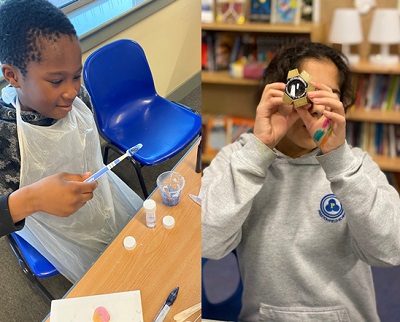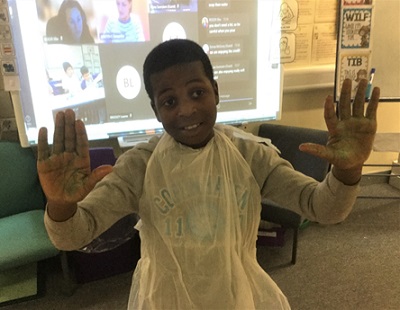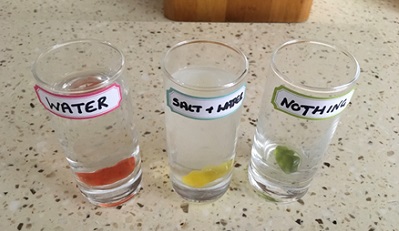My experience with Edinburgh BioQuarter’s STEM Clubs
Edinburgh BioQuarter volunteer Emma Wilson shares her experiences of delivering online STEM Clubs to local primary school children.

Hi, I’m Emma and I’m a research assistant based at the Edinburgh BioQuarter. Over the past year, I’ve been involved with delivering STEM (Science, Technology, Engineering, and Maths) Clubs to pupils from local widening participation primary schools, including Castleview, Niddrie Mill, St Francis and Prestonfield.
The Clubs aimed to engage the local community, demonstrate real STEM careers, and introduce pupils to experiments they could do in the classroom or at home.
My motivation to take part
My main motivation for getting involved in the STEM Clubs was to gain experience in science communication and improve my confidence. When I first signed up, it’s fair to say I had no idea what to expect or what I was doing, but that quickly changed as I found my feet.
However, I also had more personal reasons for wanting to get involved, as I grew up going to a widening participation school myself. I never had the opportunity to meet real scientists until I went to university, and I knew I would have benefited from activities like this when I was in school.
What’s involved?

Each Club session lasted an hour and was hosted virtually with the pupils either in the classroom with their teacher or at home using their own devices. All areas of biology, chemistry and physics were covered with different themes each week, from extracting their own DNA to making toothpaste and building model race cars.
The feedback from the schools and pupils was really encouraging. The pupils were always excited about the Clubs, and it was incredibly rewarding to see their enthusiasm for STEM. An article about the STEM Clubs was even featured on the Edinburgh Evening News website.
Support was always available
The STEM Club organisers, Cathy and Ellie from Edinburgh BioQuarter’s Community Engagement Team, were always on hand to give support and guidance, and the teachers and pupils were so appreciative of the Clubs. As the STEM Clubs were developed in partnership with the schools, I felt that really helped to make sure the activities were tailored to the right level and the pupils enjoyed themselves.
There was always someone from the Community Engagement Team present to facilitate the session, and the teachers were fantastic, even popping in during the Clubs where the pupils were joining from home.
Challenges of virtual STEM Clubs

The Microsoft Teams virtual format definitely had its strengths and weaknesses. In the first round of STEM Clubs, the pupils from Niddrie Mill Primary joined from home using their own devices. This meant the chat was lively with questions, but for safeguarding reasons the pupils had to keep their microphones and cameras switched off. Leading the sessions sometimes felt like talking to a blank screen, and it was hard to tell if the pupils were following along or needed me to slow down. Later on in the year, all the Clubs were done in the classroom, which meant we could see the whole class on camera and could reach more schools in one session.
Another challenge was choosing activities that were appropriate for the virtual format. In the Contamination Detectives activity, pupils learned how washing their hands can stop the spread of diseases by doing an activity using water and glitter. The activity worked great in the sessions that were run in the classroom, but not so well with the Niddrie pupils who were using their own devices from home (glitter, water, and computers do not mix!).
Gaining confidence to do more
Since taking part in the STEM Clubs, I’ve gained the confidence to get involved in more science communication and outreach work. Last year, I became a registered STEM Ambassador, and have worked directly with schools to deliver activities, including a ‘Meet the Scientist’ interview with P7 pupils from Knightsridge Primary in West Lothian.

In June, I ran my own ‘Introduction to Biomedical Sciences’ workshop for P7 pupils from Colinton Primary in Edinburgh as part of the University of Edinburgh’s Widening Participation Early Years Project. The project aims to introduce and normalise concepts related to going to university. For my workshop, I chose to have the pupils conduct an osmosis experiment using gummy bears that was inspired by an activity I had led in one of the STEM Clubs.
Getting involved
I would really recommend getting involved with outreach activities. The benefit taking part in STEM Clubs gave to my career and my confidence is immeasurable. There are lots of opportunities to get involved with outreach, science communication, and community engagement within the University of Edinburgh and further afield. You can learn about some of the initiatives on offer below.
Emma Wilson is a Research Assistant with the CAMARADES Research Group, based in the Centre for Clinical Brain Sciences. Her research focuses on preclinical systematic reviews, research improvement, and open research. She is keen to inspire and engage young people with high-quality research.
Over the past year, volunteers from across Edinburgh BioQuarter have been delivering hands-on science activities to primary school children based in the local community



